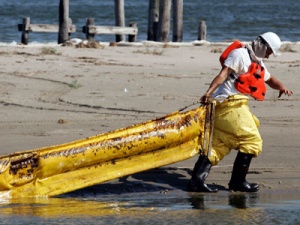BP oil slick nears Florida’s prized beaches

The giant slick from the BP oil spillage is nearing Florida’s prized sandy beaches, according to officials.
A sheen of oil, containing thousands of tar balls and debris from the Gulf of Mexico spill, is now only nine miles from Pensacola on the Florida panhandle.
“It’s inevitable that we will see it on the beaches,” said Keith Wilkins, an Escambia County official.
“This is one thing that could hurt more than a recession, more than four hurricanes coming into Florida in one season,” he added
The oil spill may reach Florida’s shores as soon as Friday, according to experts.
ADVERTISEMENT
State leaders fear the oil will devastate a tourist industry that is still reeling from the recession.
Experts fear there is little anyone can do to stop the relentless creep of the crude into the Atlantic Ocean towards the state’s 1,260 miles of coastline and 825 miles of sandy beaches.
Resort areas from Key West to Palm Beach were yesterday wondering if and when the oil would reach their waters.
Commandant Admiral Thad Allen, the National Incident Commander of the oil spill, said crews are using chemical dispersants to break up the oil.
Workers are also placing more booms along the threatened coastline in an effort to protect its beaches and wildlife.
Florida Governor Charlie Crist told a news conference: “The goal is to remove that oil from near shore waters and prevent or minimise any potential impacts on our state.”
In Louisiana, the worst-affected state, Governor Bobby Jindal told a news conference that the White House had approved the construction of five sand barriers, or berms, off its coastline - and had ordered BP to pay for the work at a total cost of $360 million.
In a statement released today, BP said it supported the decision, although it would not manage the construction directly or assume “any liability for unintended consequences of the project”.
Tony Hayward, chief executive, said: “BP is committed to implementing the most effective measures to protect the coastline of Louisiana and reduce the impact of the oil and gas spill in the Gulf of Mexico.
It is understood that the projects could take six to nine months to construct, with some taking up to a year, and experts are divided as to whether they are an effective response to the spill.
BP has already paid out $170 million to Louisiana, Alabama, Mississippi, and Florida to help deal with the impact of the spill. The company has also paid about $42 million in compensation to people and companies affected.
The oil began leaking into the Gulf of Mexico on 20 April when the Deepwater Horizon drilling rig exploded, killing 11 workers.
BP is drilling two relief wells to permanently stop the leak but they are not expected to be completed until August.
A “top kill” method, which had been considered the best hope for plugging the leak, failed over the weekend when engineers were unable to pump enough heavy mud into the well to staunch the oil flow.
The company is currently attempting to contain the spill from the well by cutting off the fractured pipe and sealing it with a cap. Its efforts received a boost yesterday when a saw that had become stuck in a thick pipe on the sea bed for hours was freed.
In a speech in Pennsylvania on Wednesday, President Barack Obama said that the leak “may prove to be a result of human error, or of corporations taking dangerous shortcuts to compromise safety”.
He went on: “We have to acknowledge that there are inherent risks to drilling four miles beneath the surface of the Earth.
“These are risks that are bound to increase the harder oil extraction becomes.”
“I will continue to make the case for a clean energy future wherever and whenever I can,” he said. “I will work with anyone to get this done.”

